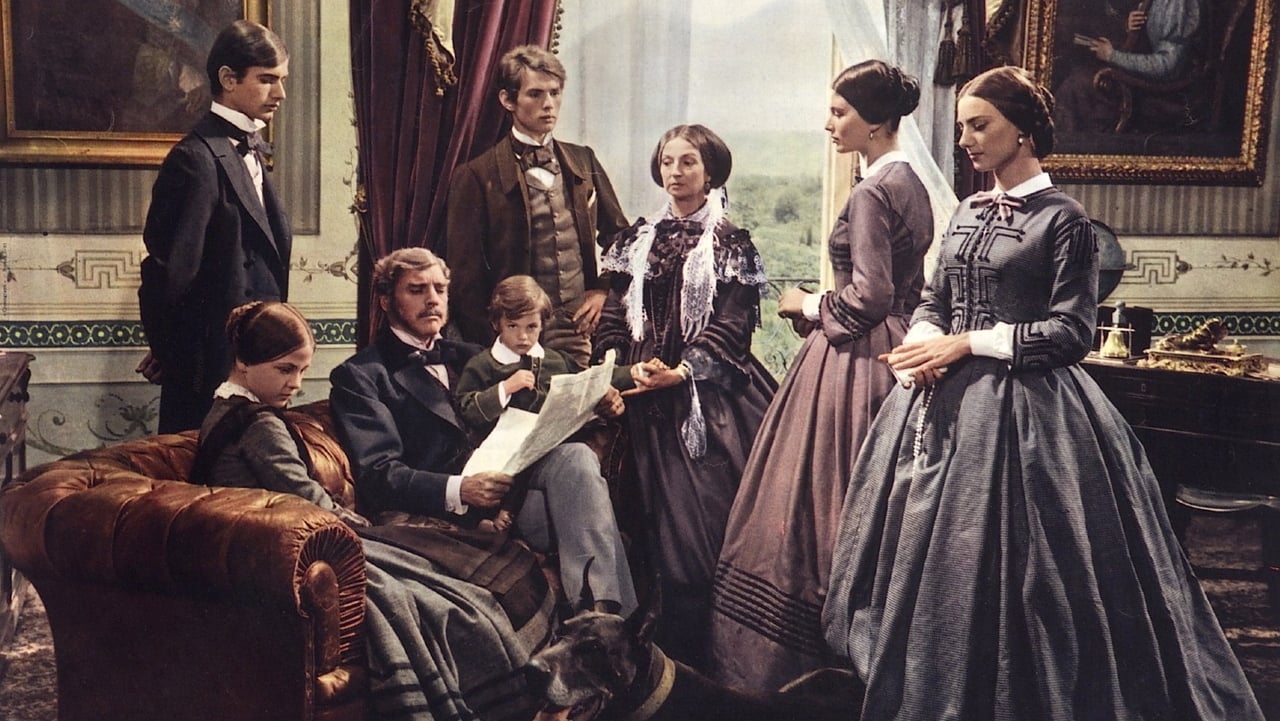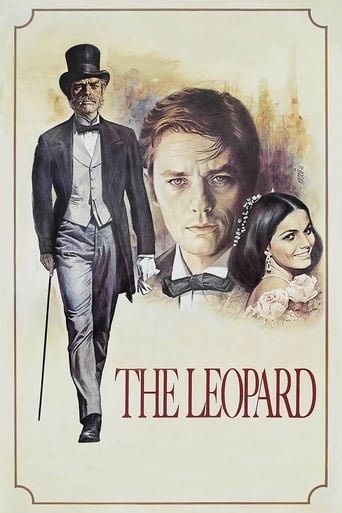



Very disappointing...
Watch something else. There are very few redeeming qualities to this film.
View MoreWatching it is like watching the spectacle of a class clown at their best: you laugh at their jokes, instigate their defiance, and "ooooh" when they get in trouble.
View MoreWorth seeing just to witness how winsome it is.
I've been on IMDb for over 10 years and I've never written a review before, but this time I was so disappointed with this film that I needed to write something. The Leopard is a film that's universally praised, even the great Martin Scorsese hails it as an essential piece, so I expected a solid masterpiece, but that wasn't the case here. I'm a big fan of Death in Venice and Rocco and His Brothers (both directed by Visconti), I usually enjoy long period films and I'm not really concerned when "nothing happens" in a film, but that's because when a film doesn't have a clear plot, it usually involves some serious character development or images that tell a story, even if it's not linear; unfortunately this film gets lost in itself, not really knowing what it wants to be, it's incredibly uneven, the political aspect that provides the context seems rather superficial even if the dialogue is mostly about politics and in the end it doesn't commit to anything, we get the main character who is the only one who seems like a real human being and not a one-dimensional statue, and Lancaster does a very good job with what he's given, but he becomes a spectator to the central couple that could not be more bland and uninteresting, they're supposed to be young and full of life but they seem to be uncapable of any real emotion (and Alain Delon is usually a great actor) and there's no way the audience could actually care about them. The production design, cinematography, costumes and music are indeed remarkable, I don't know how the book tells the story because I haven't read it, but even if it's a faithful adaptation, there should have been some sort of work in character development, pacing and finding a central line, because even in a film that's simply about "a few moments in the life of a family" there should be a theme that's fully explored, and yes, Don Fabrizio has an arc, seeing he's no longer relevant in the world but that would've worked if the people around him actually felt like real people. At last I'd also like to mention that the dubbing IS a problem, a lot of people say that it shouldn't take you out of the story but isn't a truly great film in the sound era supposed to have audio correctly synced? That's actually a problem for most (if not all) Italian films from the 60s (including La Dolce Vita, and 8 1/2) and I just can't ignore it because it is ultimately a flaw. So overall, I would never call this a terrible film or even a truly bad one, but I would say it is ineffective, flawed and definitely not a masterpiece.
View MoreFilm Review: "Il gattopardo" (1963)Fighting through competition as "Harakiri" directed by Masaki Kobayashi (1916-1996) and "To Kill A Mocking Bird" directed by Robert Mulligan (1925-2008) at Cannes Film Festival 1963 in its 16th edition, the ultra-lavish production value-indulging "Il gattopardo" directed by exceptional Italian director in visual and emotional transcendence Luchino Visconti (1906-1976) marks his masterpiece on international cinema with Hollywood leading actor Burt Lancaster (1913-1994) as Don Fabrizio Salina, the main character fighting insulting change in aristocratic societies with proletarian revolutionaries as the character of Tancredi Falconeri and Mario Girotti, portrayed by Alain Delon and Terence Hill respectively, when the eternal-feminine-sharing actress Claudia Cardinale as character of Angelica Sedara, at age 27, tribute to Guiseppe di Tomasi di Lampedua's novel from 1958 gives director Visconti the oppportunity to shine by finding balance in ultimate cinemascope visuals and sound to score by legendary composer Nino Rota (1911-1979) galvanizes a perfect picture on the fading existence of any generation, who stays for too long inmoveable in power of the way of life for the entire world to breathtaking quotes by the leading man, performed by match-making Lancaster: "It has to change everything in order to let everything stay as it is," before walking off into dark allies in night exteriors of mingling aristocrats with the organized proletariat."The Leopard" strikes further high notes with Academy-Award-nominated Costume Design by Piero Tosi, who favors Luchino Visconti's directorial vision, when this motion picture for the ages finds cinematic peaks in a 40-Minutes-ball scene in opera-splendid reception, where the inevitable change in 1860s Sicily, Italy becomes unstoppable with a smiling and whipping eye of life-exposing tragic proportions that any spectator take the time to witness this 180-Minutes-Film winning then without a doubt the "Palme d'Or" in its first international festival exhibition that becomes impeccable to deny by any audience that a human's life'S structures of security fade, where every individual on the planet strives from, getting here jeopardized over a single night of extravaganza. Copyright 2018 Cinemajsty Entertainments LLC
View MoreNo doubt about it, The Leopard with its DeMille like opulence is a thing of sheer beauty. As subject matter for an American audience I think that unless one has a knowledge of Italian history this film might just be a bit arcane for an American audience.Burt Lancaster who was hired for American and worldwide box office clout is the lead here. He plays the head of an honored noble house in Sicily which is seeing the end of power with the end of the Kingdom of the two Sicilies which is roughly the island of Sicily with the lower half of the Italian peninsula up to around Naples. Giuseppe Garibaldi is leading a revolt against the ruling Bourbon house there. Lancaster's nephew Alain Delon has joined with Garibaldi's army purely for reasons of self preservation for himself and the family. Delon is quite the opportunist. As for Lancaster he looks over the ruins of the society he was a leader in with a dour pessimism just like Ashley Wilkes at the end of the Civil War. In fact The Leopard bears more than a passing resemblance to Gone With The Wind. For one thing it was the epic novel only published work of two authors talking about long gone societies which they were told tales about as kids.Things take a conservative twist in Italy. The House Of Savoy which ruled the island of Sardinia and Piedmont area of Northern Italy kept itself in business and now was uniting Italy under a constitutional monarchy. One of the locals who's amassed a fortune Paolo Stoppa is in tight with these folks. Alain Delon is courting Stoppa's daughter Claudia Cardinale. A marriage between the two houses will insure financial security for Lancaster and relations and Stoppa gets the prestige of an old and honored name. Lancaster isn't crazy about Delon marrying beneath him, but he sure likes what he sees in Cardinale.I saw an abbreviated version of The Leopard with battle footage and the some of the climactic ballroom scene cut out. Lucchino Visconti certainly had the skill to bring off a portrayal of Italy's past. His characters are interesting and certainly Burt Lancaster is most impressive as a man some 300 years behind the time and he knows it. Lancaster has some sad predictions for Italy's future and again a knowledge of how Fascism came to Italy is helpful.The Leopard is an impressive film, but arcane for American audiences.
View MoreIn 1860 Garibaldi and his volunteers conquered Sicily, defeating the Bourbons and setting the stage for Italian unification. In The Leopard, Visconti's adaptation of a great Italian novel, a noble Sicilian family, led by pater familias Don Fabrizio Salina (Burt Lancaster), faces this crucial event and its aftermath.The film is impeccable, gorgeously shot with a great eye for colors, lighting and composition, luscious costumes and set design, a marvellous soundtrack by Nino Rota.In one of the great examples of serendipitous casting in cinema history, Burt Lancaster was imposed upon Visconti by the production, much to the director's distrust: it turned out to be the best performance of Lancaster's career, as he perfectly embodied proud, educated, fiery, sensual Prince Fabrizio. Alain Delon plays his nephew Tancredi, the happy-go-lucky youngster who falls for beautiful social climber Angelica (a young and radiant Claudia Cardinale), daughter of nouveau riche Calogero Sedara (Paolo Stoppa). Every supporting performance is gold, with my favorite probably being Romolo Valli as keen, quietly disapproving priest Padre Pirrone.The Leopard is about the entropic dissolution of life - rituals and divertissements like the famous ballroom scene are the last moments of a dying breed which is either desperately trying to adapt to a new world or tragically oblivious to it. With a sensitivity worthy of Tolstoy, the novel and the movie follow Fabrizio, torn between his intense physicality and a painful understanding of time running out for both himself and his class. The last waltz is for death itself."We were the leopards, the lions, those who take our place will be jackals and sheep, and the whole lot of us - leopards, lions, jackals and sheep - will continue to think ourselves the salt of the earth."10/10
View More